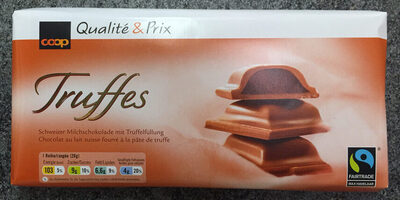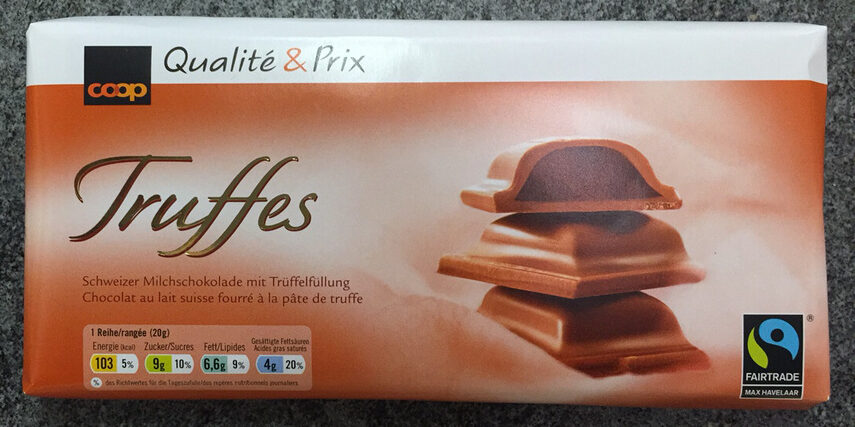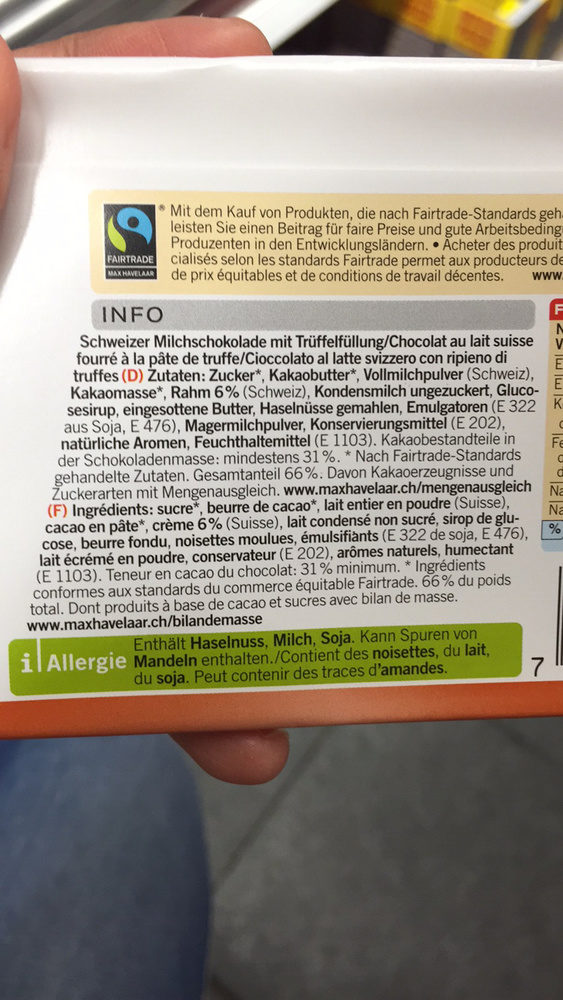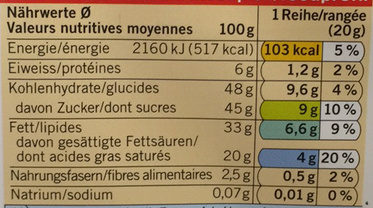Help us make food transparency the norm!
As a non-profit organization, we depend on your donations to continue informing consumers around the world about what they eat.
The food revolution starts with you!
Qualité&Prix : Truffes - Coop - 100 g
Qualité&Prix : Truffes - Coop - 100 g
This product page is not complete. You can help to complete it by editing it and adding more data from the photos we have, or by taking more photos using the app for Android or iPhone/iPad. Thank you!
×
Barcode: 7611654606826 (EAN / EAN-13)
Quantity: 100 g
Brands: Coop
Categories: Snacks, Sweet snacks, Cocoa and its products, Chocolates, Milk chocolates, Filled chocolates, Filled milk chocolates
Labels, certifications, awards:
Fair trade, Fairtrade International, FSC, FSC Mix, Max Havelaar


Traceability code: FSC-C010395
Countries where sold: Switzerland
Matching with your preferences
Health
Ingredients
-
18 ingredients
: sucre, beurre de cacao, lait entier en poudre (Suisse), cacao en pâte, crème 6% (Suisse), lait condensé non sucré, sirop de glucose, beurre fondu, noisettes moulues, émulsifiants (E322 de soja, E476), lait écrémé en poudre, conservateur (E202), arômes naturels, humectant (E1103)Allergens: Milk
Food processing
-
Ultra processed foods
Elements that indicate the product is in the 4 - Ultra processed food and drink products group:
- Additive: E322 - Lecithins
- Additive: E476 - Polyglycerol polyricinoleate
- Ingredient: Emulsifier
- Ingredient: Flavouring
- Ingredient: Glucose
- Ingredient: Glucose syrup
- Ingredient: Humectant
Food products are classified into 4 groups according to their degree of processing:
- Unprocessed or minimally processed foods
- Processed culinary ingredients
- Processed foods
- Ultra processed foods
The determination of the group is based on the category of the product and on the ingredients it contains.
Additives
-
E1103 - Invertase
Invertase: Invertase is an enzyme that catalyzes the hydrolysis -breakdown- of sucrose -table sugar- into fructose and glucose. Alternative names for invertase include EC 3.2.1.26, saccharase, glucosucrase, beta-h-fructosidase, beta-fructosidase, invertin, sucrase, maxinvert L 1000, fructosylinvertase, alkaline invertase, acid invertase, and the systematic name: beta-fructofuranosidase. The resulting mixture of fructose and glucose is called inverted sugar syrup. Related to invertases are sucrases. Invertases and sucrases hydrolyze sucrose to give the same mixture of glucose and fructose. Invertases cleave the O-C-fructose- bond, whereas the sucrases cleave the O-C-glucose- bond.For industrial use, invertase is usually derived from yeast. It is also synthesized by bees, which use it to make honey from nectar. Optimal temperature at which the rate of reaction is at its greatest is 60 °C and an optimum pH of 4.5. Typically, sugar is inverted with sulfuric acid.Source: Wikipedia
-
E202 - Potassium sorbate
Potassium sorbate (E202) is a synthetic food preservative commonly used to extend the shelf life of various food products.
It works by inhibiting the growth of molds, yeast, and some bacteria, preventing spoilage. When added to foods, it helps maintain their freshness and quality.
Some studies have shown that when combined with nitrites, potassium sorbate have genotoxic activity in vitro. However, potassium sorbate is generally recognized as safe (GRAS) by regulatory authorities.
-
E322 - Lecithins
Lecithins are natural compounds commonly used in the food industry as emulsifiers and stabilizers.
Extracted from sources like soybeans and eggs, lecithins consist of phospholipids that enhance the mixing of oil and water, ensuring smooth textures in various products like chocolates, dressings, and baked goods.
They do not present any known health risks.
-
E476 - Polyglycerol polyricinoleate
Polyglycerol polyricinoleate: Polyglycerol polyricinoleate -PGPR-, E476, is an emulsifier made from glycerol and fatty acids -usually from castor bean, but also from soybean oil-. In chocolate, compound chocolate and similar coatings, PGPR is mainly used with another substance like lecithin to reduce viscosity. It is used at low levels -below 0.5%-, and works by decreasing the friction between the solid particles -e.g. cacao, sugar, milk- in molten chocolate, reducing the yield stress so that it flows more easily, approaching the behaviour of a Newtonian fluid. It can also be used as an emulsifier in spreads and in salad dressings, or to improve the texture of baked goods. It is made up of a short chain of glycerol molecules connected by ether bonds, with ricinoleic acid side chains connected by ester bonds. PGPR is a yellowish, viscous liquid, and is strongly lipophilic: it is soluble in fats and oils and insoluble in water and ethanol.Source: Wikipedia
Ingredients analysis
-
May contain palm oil
Ingredients that may contain palm oil: Butterfat
-
Non-vegan
Non-vegan ingredients: Whole milk powder, Cream, Evaporated milk, Butterfat, Skimmed milk powder
-
Maybe vegetarian
Ingredients that may not be vegetarian: Natural flavouring
-
Details of the analysis of the ingredients
: sucre, beurre de cacao, lait entier en poudre, cacao en pâte, crème 6%, lait condensé non sucré, sirop de glucose, beurre fondu, noisettes, émulsifiants (e322 de soja, e476), lait écrémé en poudre, conservateur (e202), arômes naturels, humectant (e1103)- sucre -> en:sugar - vegan: yes - vegetarian: yes - ciqual_proxy_food_code: 31016 - percent_min: 7.14285714285714 - percent_max: 76
- beurre de cacao -> en:cocoa-butter - vegan: yes - vegetarian: yes - ciqual_food_code: 16030 - percent_min: 6 - percent_max: 41
- lait entier en poudre -> en:whole-milk-powder - vegan: no - vegetarian: yes - ciqual_food_code: 19021 - percent_min: 6 - percent_max: 29.3333333333333
- cacao en pâte -> en:cocoa-paste - vegan: yes - vegetarian: yes - ciqual_proxy_food_code: 16030 - percent_min: 6 - percent_max: 23.5
- crème -> en:cream - vegan: no - vegetarian: yes - ciqual_food_code: 19402 - percent_min: 6 - percent: 6 - percent_max: 6
- lait condensé non sucré -> en:evaporated-milk - vegan: no - vegetarian: yes - ciqual_proxy_food_code: 19051 - percent_min: 0 - percent_max: 6
- sirop de glucose -> en:glucose-syrup - vegan: yes - vegetarian: yes - ciqual_proxy_food_code: 31016 - percent_min: 0 - percent_max: 6
- beurre fondu -> en:butterfat - vegan: no - vegetarian: yes - from_palm_oil: maybe - ciqual_food_code: 16401 - percent_min: 0 - percent_max: 6
- noisettes -> en:hazelnut - vegan: yes - vegetarian: yes - ciqual_food_code: 15004 - percent_min: 0 - percent_max: 6
- émulsifiants -> en:emulsifier - percent_min: 0 - percent_max: 6
- e322 de soja -> en:soya-lecithin - vegan: yes - vegetarian: yes - ciqual_food_code: 42200 - percent_min: 0 - percent_max: 6
- e476 -> en:e476 - vegan: yes - vegetarian: yes - percent_min: 0 - percent_max: 3
- lait écrémé en poudre -> en:skimmed-milk-powder - vegan: no - vegetarian: yes - ciqual_food_code: 19054 - percent_min: 0 - percent_max: 6
- conservateur -> en:preservative - percent_min: 0 - percent_max: 6
- e202 -> en:e202 - vegan: yes - vegetarian: yes - percent_min: 0 - percent_max: 6
- arômes naturels -> en:natural-flavouring - vegan: maybe - vegetarian: maybe - percent_min: 0 - percent_max: 5
- humectant -> en:humectant - percent_min: 0 - percent_max: 5
- e1103 -> en:e1103 - vegan: yes - vegetarian: yes - percent_min: 0 - percent_max: 5
Nutrition
-
Bad nutritional quality
⚠ ️Warning: the amount of fruits, vegetables and nuts is not specified on the label, it was estimated from the list of ingredients: 0This product is not considered a beverage for the calculation of the Nutri-Score.
Positive points: 2
- Proteins: 3 / 5 (value: 6, rounded value: 6)
- Fiber: 2 / 5 (value: 2.5, rounded value: 2.5)
- Fruits, vegetables, nuts, and colza/walnut/olive oils: 0 / 5 (value: 0, rounded value: 0)
Negative points: 25
- Energy: 6 / 10 (value: 2106, rounded value: 2106)
- Sugars: 9 / 10 (value: 45, rounded value: 45)
- Saturated fat: 10 / 10 (value: 20, rounded value: 20)
- Sodium: 0 / 10 (value: 28, rounded value: 28)
The points for proteins are not counted because the negative points are greater or equal to 11.
Nutritional score: (25 - 2)
Nutri-Score:
-
Nutrient levels
-
Fat in high quantity (33%)
What you need to know- A high consumption of fat, especially saturated fats, can raise cholesterol, which increases the risk of heart diseases.
Recommendation: Limit the consumption of fat and saturated fat- Choose products with lower fat and saturated fat content.
-
Saturated fat in high quantity (20%)
What you need to know- A high consumption of fat, especially saturated fats, can raise cholesterol, which increases the risk of heart diseases.
Recommendation: Limit the consumption of fat and saturated fat- Choose products with lower fat and saturated fat content.
-
Sugars in high quantity (45%)
What you need to know- A high consumption of sugar can cause weight gain and tooth decay. It also augments the risk of type 2 diabetes and cardio-vascular diseases.
Recommendation: Limit the consumption of sugar and sugary drinks- Sugary drinks (such as sodas, fruit beverages, and fruit juices and nectars) should be limited as much as possible (no more than 1 glass a day).
- Choose products with lower sugar content and reduce the consumption of products with added sugars.
-
Salt in low quantity (0.07%)
What you need to know- A high consumption of salt (or sodium) can cause raised blood pressure, which can increase the risk of heart disease and stroke.
- Many people who have high blood pressure do not know it, as there are often no symptoms.
- Most people consume too much salt (on average 9 to 12 grams per day), around twice the recommended maximum level of intake.
Recommendation: Limit the consumption of salt and salted food- Reduce the quantity of salt used when cooking, and don't salt again at the table.
- Limit the consumption of salty snacks and choose products with lower salt content.
-
-
Nutrition facts
Nutrition facts As sold
for 100 g / 100 mlAs sold
per serving (20 g)Compared to: Filled milk chocolates Energy 2,106 kj
(503 kcal)421 kj
(101 kcal)-8% Fat 33 g 6.6 g -4% Saturated fat 20 g 4 g +7% Carbohydrates 48 g 9.6 g -9% Sugars 45 g 9 g -9% Fiber 2.5 g 0.5 g +21% Proteins 6 g 1.2 g -7% Salt 0.07 g 0.014 g -68% Fruits‚ vegetables‚ nuts and rapeseed‚ walnut and olive oils (estimate from ingredients list analysis) 0 % 0 %
Environment
-
Eco-Score D - High environmental impact
⚠ ️Select a country in order to include the full impact of transportation.The Eco-Score is an experimental score that summarizes the environmental impacts of food products.→ The Eco-Score was initially developped for France and it is being extended to other European countries. The Eco-Score formula is subject to change as it is regularly improved to make it more precise and better suited to each country.Life cycle analysis
-
Average impact of products of the same category: D (Score: 38/100)
Category: Milk chocolate, filled
Category: Milk chocolate, filled
- PEF environmental score: 0.78 (the lower the score, the lower the impact)
- including impact on climate change: 12.74 kg CO2 eq/kg of product
Stage Impact Agriculture
43.5 %Processing
50.8 %Packaging
1.3 %Transportation
3.7 %Distribution
0.6 %Consumption
0.0 %
Bonuses and maluses
-
Labels with environmental benefits
Bonus: +10
-
Fairtrade International
Fair trade is an arrangement designed to help producers in developing countries achieve sustainable and equitable trade relationships. Members of the fair trade movement add the payment of higher prices to exporters, as well as improved social and environmental standards.
-
-
Origins of ingredients with a high impact
Malus: -3
Environmental policy: -3
Transportation: 0
Origin of the product and/or its ingredients % of ingredients Impact Unknown 77 %High Switzerland 23 %Medium
-
Missing packaging information for this product
Malus: -15
⚠ ️ The information about the packaging of this product is not filled in.⚠ ️ For a more precise calculation of the Eco-Score, you can modify the product page and add them.
If you are the manufacturer of this product, you can send us the information with our free platform for producers.
Eco-Score for this product
-
Impact for this product: D (Score: 30/100)
Product: Qualité&Prix : Truffes - Coop - 100 g
Life cycle analysis score: 38
Sum of bonuses and maluses: -8
Final score: 30/100
-
Carbon footprint
-
Equal to driving 6.6 km in a petrol car
1274 g CO² per 100g of product
The carbon emission figure comes from ADEME's Agribalyse database, for the category: Milk chocolate, filled (Source: ADEME Agribalyse Database)
Stage Impact Agriculture
31.2 %Processing
65.4 %Packaging
0.8 %Transportation
2.4 %Distribution
0.1 %Consumption
0.0 %
Packaging
-
Missing packaging information for this product
⚠ ️ The information about the packaging of this product is not filled in.Take a photo of the recycling information Take a photo of the recycling information
Transportation
-
Origins of ingredients
Origins of ingredients with a high impact
Origin of the product and/or its ingredients % of ingredients Impact Unknown 77 %High Switzerland 23 %Medium
Labels
-
Fairtrade International
Fair trade is an arrangement designed to help producers in developing countries achieve sustainable and equitable trade relationships. Members of the fair trade movement add the payment of higher prices to exporters, as well as improved social and environmental standards.
Report a problem
-
Incomplete or incorrect information?
Category, labels, ingredients, allergens, nutritional information, photos etc.
If the information does not match the information on the packaging, please complete or correct it. Open Food Facts is a collaborative database, and every contribution is useful for all.
Data sources
Product added on by openfood-ch-import
Last edit of product page on by worldtest.
Product page also edited by moon-rabbit, openfoodfacts-contributors, roboto-app, teolemon.











